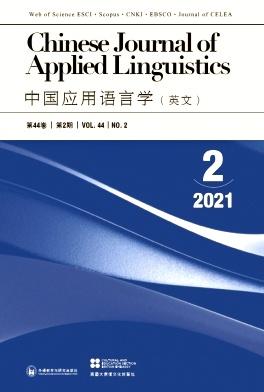是去钓鱼还是去钓鱼?英语学习者对形容分词的困惑
IF 1.1
4区 教育学
Q3 EDUCATION & EDUCATIONAL RESEARCH
引用次数: 0
摘要
摘要本研究调查了英语学习者如何在句子中的定语和表语位置处理形容词分词,以确定与分词相关的困难是源于学习者特有的还是英语特有的特征。一个汉语组和一个混合语言组参与了研究1,在没有上下文线索的情况下使用英语中的目标句子作为第二语言。一组中国参与者参加了第二项研究,该研究使用了带有上下文线索的目标句。结果表明,在控制英语水平后,两组在名词前定语形容词分词的使用方面表现不同(研究1)。语境提示对中国学习者的学习成绩没有促进作用(研究2)。当提供上下文线索时,目标词频效应消失。这些发现表明,形容词分词的复杂性不仅在于英语的语言特征,还在于母语背景和英语水平的学习者特征。本文章由计算机程序翻译,如有差异,请以英文原文为准。
Going for -ing or -en? A Puzzle about Adjectival Participles for Learners of English
Abstract This study investigates how learners of English process adjectival participles in both attributive and predicative positions within sentences in order to identify whether difficulties associated with participles stem from learner-specific or English-specific characteristics. A Chinese-speaking group and a mixed language group participated in Study 1 that used the target sentence in English as L2 without contextual cues. A subgroup of the Chinese participants took part in Study 2 that used target sentences with contextual cues. Results showed that the two groups’ performance was different in the use of pre-nominal attributive adjectival participles after controlling for English proficiency (Study 1). Contextual cues did not facilitate Chinese learners’ performance (Study 2). The target word frequency effects disappeared when contextual cues were provided. These findings suggest that the complexities of adjectival participles reside not only in the linguistic characteristics of English, but also in the learner characteristics of L1 background and English proficiency.
求助全文
通过发布文献求助,成功后即可免费获取论文全文。
去求助
来源期刊

Chinese Journal of Applied Linguistics
EDUCATION & EDUCATIONAL RESEARCH-
CiteScore
1.50
自引率
0.00%
发文量
377
期刊介绍:
The Chinese Journal of Applied Linguistics (CJAL) (formerly known as Teaching English in China – CELEA Journal) was created in 1978 as a newsletter by the British Council, Beijing. It is the affiliated journal of the China English Language Education Association (founded in 1981 and now the Chinese affiliate of AILA [International Association of Applied Linguistics]). The Chinese Journal of Applied Linguistics is the only English language teaching (ELT) journal in China that is published in English, serving as a window to Chinese reform on ELT for professionals in China and around the world. The journal is internationally focused, fully refereed, and its articles address a wide variety of topics in Chinese applied linguistics which include – but also reach beyond – the topics of language education and second language acquisition.
 求助内容:
求助内容: 应助结果提醒方式:
应助结果提醒方式:


